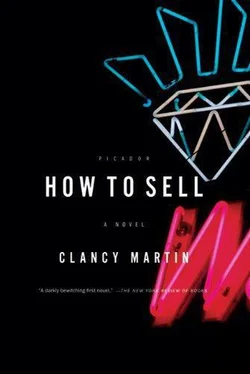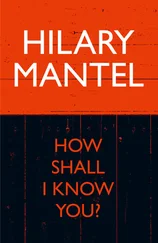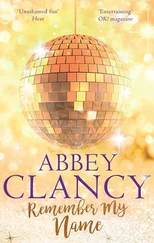“I’ll meet you upstairs, boys,” he said. “Go on up without me.”
I held the elevator door so that I could watch him for a minute. He stood at the front desk and smiled that smile at her. He leaned across the counter and whispered something in her ear. She laughed. It was a thick laugh full of musical notes like a lioness’s cough.
By the time he came up, two hours later, Jim and I were full of champagne and in the suite’s side-by-side oversized marble tubs.
“I’m going to bed, boys,” he said. “I’m exhausted.” He winked at us both.
The next day over dinner our dad confronted us. We were eating Steak Diane in the private dining room. Jim and I were splitting a second bottle of Montrachet — he always preferred whites — and our dad was drinking a Fresca. Then he ordered a near-beer.
“Okay, boys, enough. You two set this up just to impress your old man. This is foolishness. Come on, son,” he said to Jim firmly.
I stepped into the background and focused on my steak. As a younger brother that was my expertise and my privilege.
“You need to start covering your nut. Put this cash aside. When are you going to go out on your own? You’ll never get rich working for somebody else. This ought to be part of your seed money, son.”
Then he turned his attention to me.
“Let’s have a talk just the two of us, Bobby. Dindy, I need to talk privately to your brother.”
“We’re in the middle of dinner, Dad,” I said.
“Finish up, then,” he said. He pushed his plate away. “Come on, Rob, let’s take a ride. Dindy, you go chase a skirt in the bar. Find one for us both. For that matter go find three of them, son. We’re in a hotel, aren’t we?”
While the valet brought up his car my dad took me by the biceps the way he sometimes would. I tried to flex, subtly.
“Look, your old man’s not a fool. I visit you guys astrally. That’s the best way for me to keep tabs on you both. And not just at night, son. I can keep an eye on you anytime I meditate. Something the monks taught me up in Srinagar. I won’t tell you how often I come take a look. It’s more often than you think. You have to remember I spend thirty or forty hours a week in samadhi now. Like William Blake. These days I spend most of my hours in paradise, son.” I had a photo of him from the time he was in Srinagar glued in the inside cover of my copy of Jonathan Livingston Seagull . His head was shaved and he was wearing an orange down parka. I thought that was odd. I had expected him to be in robes. In my wallet I had a similar photo, but without the parka, from his last trip to Tibet.
When the valet handed him the keys he passed them on to me.
“You drive, son,” he said.
We got in the car.
“I told your mother it was not the right time for you to be down here. Your brother is an old soul, it’s less dangerous for him.”
“There’s nothing going on, Dad. I am still going to go to college. I am still going to finish high school. I am just making some extra money.”
“There’s something dishonest about this business, son. I’m not worried about Dindy. But you know the problems you’ve had. With honesty. Not to mention stealing. You know the old saying, son. Opportunity makes the thief. You don’t want to be caught hiding your hands in your pockets again. I know you remember what I’m talking about.”
He was referring to a time when I was five years old at a car dealership. He was buying a new Lincoln Continental and there was a dish of pink and purple candies on the salesman’s desk. No one offered one to me, so while they were talking I grabbed a couple or three or four and stuck them in my pockets. But then later when we were looking at the new car and the sales manager had come out to congratulate my father on his purchase, he looked down at me and said, “Why do you have your hands in your pockets like that, young fella? What are you hiding in there?” He was only joking but I did not realize it and I showed them the candy. It got a big laugh. But later my father wanted to moralize about it, and he brought it up again when I was first caught shoplifting in second grade, and on other occasions that had presented themselves over the years.
“What about that Lisa girl? You want to tell me what’s going on there? What’s your brother up to?”
This time he raised his glasses and gave me the real green-eyed stare. I tried to concentrate on my driving. Now he was not messing around. I did not know if he was bluffing because he already knew about me and Lisa or if he only wanted me to tell him about Jim’s extramarital affair.
If I could have, I would have asked him if he could see anything about Jim and the Polack. Lisa had said that Jim and the Polack were up to something. “Nothing romantic,” she said. “But one of his other deals.” I figured she was jealous. It was good news if Jim was seeing the Polack. But I didn’t like the fact that Lisa was so interested in whether or not it was true. There was a good use for Dad’s extrasensory perception, I thought. To decipher a few clues for me about Jim and the Polack. But since Jim was married it wasn’t the kind of thing I could ask Dad.
“Nothing, Dad. She’s a friend of ours. She’s like a sister.”
“A sister. Right. I had a dream about that girl. It was not a good dream, son.”
We were silent for a few minutes. I picked up a Cat Stevens tape that was lying next to the ashtray where he kept his pipe and put it in the tape player. Then that song about the father and the son came on so I turned it off again.
“Pull over, Robby,” he said. “Over there. Under the overpass. I have something to show you.”
We were wandering around central Dallas — I didn’t know precisely where he wanted me to go, but we were just driving to drive — and I turned onto Lovers’ Lane. We had just passed that eight-foot painted statue of Lenin that stands there in the spotlights in front of Goff’s Hamburgers.
“You know he was a Mason,” my dad said.
“What?”
“Vladimir Lenin. He was a Mason. Any great man you have ever heard of. Even Martin Luther King, Jr. They made a special exception for him.”
“Here, Dad?”
“Right over there on the shoulder. Below the underpass. That’s safe. Up there, son. Be careful. Slow down. It’s night, son! Watch what you’re doing! I’ve got something to show you.”
I stopped the car.
“Pop the trunk.”
Other cars slowed to eye us as we walked around to the back of my dad’s Honda. It was not a place you could really stop, especially after dark. There were a few honks. They were short, friendly honks, though, offering help. Maybe our car had broken down. It was windy and cold. I wanted to get back in the car. Trash and paper lifted in the air.
“Look at this,” he said, unzipping a black leather tie case. “See that?”
He handed me a check, without letting go of it. It was a cashier’s check for three hundred and sixty thousand dollars.
“That’s from Ruth Moody. Now, that’s trust, son. That’s how we’re going to open the new church,” he said. He squeezed my arm with his other hand. “That’s what a real salesman can do if he wants to. There’s a lesson in that for you.”
I wondered why he had not cashed the check yet.
We got back in the car.
“I can’t bear to sit in that hotel and watch your brother piss away all that green.”
I drove through the side streets of Highland Park so that Dad could admire the gigantic houses. I wanted him to see that Dallas was as good as Palm Beach and Coronado and the other cities he had lived in.
“It’s some hotel, though, isn’t it?” he said. His expression was proud and happy. “Of course, he’s only a kid. You can’t see that right now. But the fact is your big brother’s still just a kid.”
Читать дальше











